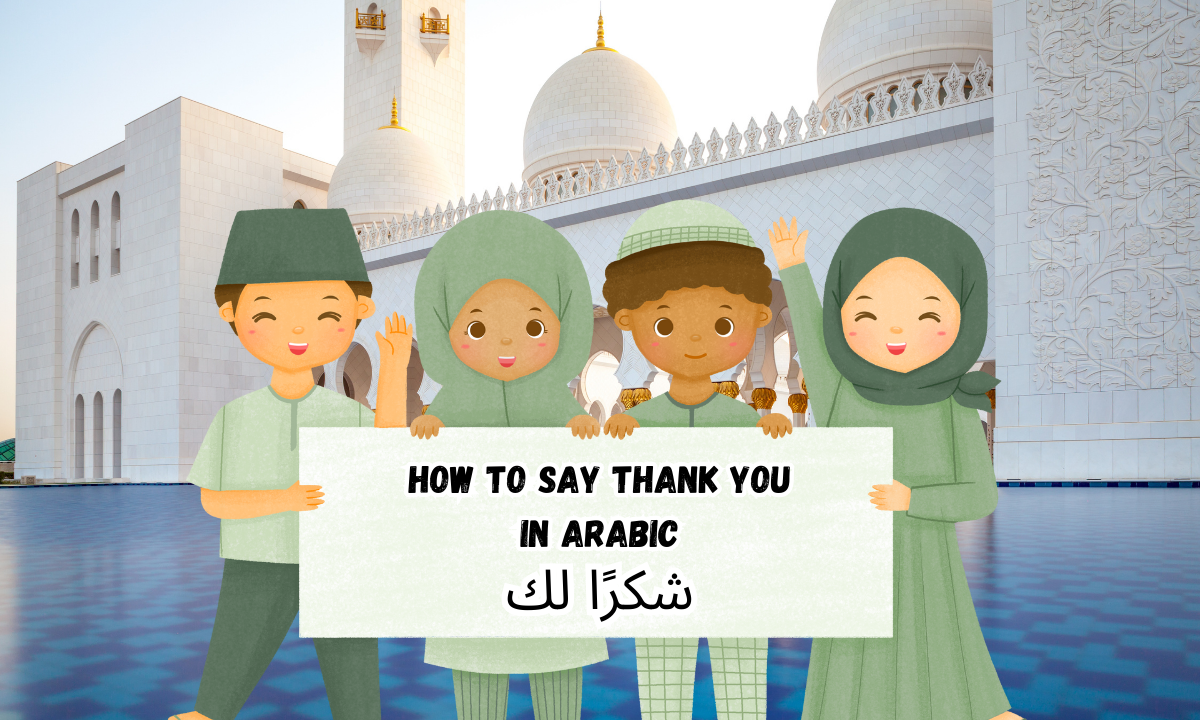Expressing thanks is a crucial part of any culture, and Arabic culture is no different. In fact, Arabic places a significant emphasis on verbal expressions of heartfelt emotions. So, if you’re learning how to say thank you in Arabic, you’re diving into a rich tapestry of phrases that convey gratitude in nuanced ways. Whether you’re socializing with Arab friends, using Arabic at work, or planning a trip to an Arabic-speaking country, knowing these expressions can help you communicate more effectively and build better relationships.
Universal Phrases for Saying “Thank You”
Shukran (شكراً)
One of the most common and widely understood ways to say thank you in Arabic is “Shukran.” This phrase is used in all Arabic-speaking countries and fits perfectly in both formal and informal settings. It’s simple, easy to remember, and goes a long way in showing your appreciation.
Shukran laka (شُكْرًا لَكَ)
To add a personal touch, you can say “Shukran laka” if you’re thanking a man, or “Shukran laki” for a woman. This translates to “Thank you” with an added “to you.” It’s a slight modification but makes your gratitude more specific and directed.
Shukran Jazeelan (شُكْرًا جَزِيلاً)
If you want to express a deeper level of gratitude, use “Shukran Jazeelan,” which means “Thank you very much.” The word “Jazeelan” adds intensity to your thanks, indicating that you’re very appreciative of the help or kindness shown to you.
Also Read Wal Habibi Meaning In Hindi – वल्लाह हबीबी का मतलब। ये क्या बोल दिया।
Religious and Formal Expressions of Thanks
Jazakallahu Khairan (جَزَاكَ اللهُ خَيْرًا)
For a touch of religious sentiment, especially in Muslim cultures, “Jazakallahu Khairan” is an excellent choice. It means “May Allah reward you with goodness.” Even though it doesn’t include the word “thank you,” it’s considered a very high form of expressing gratitude by invoking divine blessings.
Barakallahu Feeka (بَارَكَ اللهُ فِيكَ)
Another phrase with a religious undertone is “Barakallahu Feeka,” which translates to “May Allah bless you.” This phrase can be modified depending on whom you’re addressing: “Barakallahu Feeki” for a woman. It’s a warm and respectful way to say thank you in Arabic.
Heartfelt and Deeply Personal Expressions
Laka Khaalis Ash-shukr (لَكَ خَالِصُ الشُّكْرِ)
If you need a more formal and respectful way to express your gratitude, you might say “Laka Khaalis Ash-shukr,” meaning “You have my sincere thanks.” This is perfect for professional settings or when you want to show deep respect along with your gratitude.
Ashkuruka min A’maq Qalbi (أَشْكُرُكَ مِنْ أَعْمَاقِ قَلْبِي)
For those times when you want to convey heartfelt thanks, use “Ashkuruka min A’maq Qalbi,” which means “I thank you from the bottom of my heart.” It’s ideal for expressing deep and genuine gratitude to someone who has made a significant impact on you.
Haza Lutfun Minnak (هَذَا لُطْفٌ مِنْكَ)
When someone does you a favor, “Haza Lutfun Minnak,” which translates to “This is kindness from you” or “That’s nice of you,” is a graceful way to thank them. It’s a polite and elegant expression of gratitude.
Ana Mumtanan Laka lilghayah (أَنَا مُمْتَــنٌّ لَكَ للغَايَةِ)
To express profound gratitude, say “Ana Mumtanan Laka lilghayah,” meaning “I am extremely grateful to you.” This phrase is perfect for those moments when ordinary thanks just aren’t enough. Remember, if you’re a woman, you’ll say “Mumtana.”
Responding to Thanks
Afwun (عَـفْـوًا)
Now that you know how to say thank you in Arabic, how do you respond when someone thanks you? One of the most common responses is “Afwun,” which means “You’re welcome.” It literally translates to “pardon me,” suggesting that thanks are unnecessary.
Ash-shukru Lillah (الشُّكْرُ للهِ)
Another humble response is “Ash-shukru Lillah,” meaning “All thanks to God.” It reflects the speaker’s humility and acknowledgment that all good deeds are ultimately due to divine will.
Ala Al-rahbi Was-sa’ah (علَى الرَّحْبِ والسّعَةِ)
This phrase translates to “My pleasure” or “You are welcome.” It’s a warm and welcoming way to respond to someone’s thanks.
Haza Wajibi (هَذَا وَاجِبِي)
For a more duty-bound response, you can say “Haza Wajibi,” which means “It’s my duty.” It shows that you’re happy to help and see it as your responsibility.
La Alaik (لا عَـلَيْكَ)
This phrase, meaning “Never mind” or “Don’t mention it,” is another way to respond modestly to someone’s thanks.
Innahu min dawa’e sorori (إنه من دواعي سروري)
If you want to be a bit more formal, use “Innahu min dawa’e sorori,” meaning “It is my pleasure.” It’s a polite and gracious response.
Lais hunaka ay mushkila (ليس هناك أي مشكلة)
This phrase means “There is no problem,” which is a straightforward and reassuring way to respond to thanks.
Ahlan bika fi ay wakt (أهلاً بك في أيّ وقت)
Lastly, “Ahlan bika fi ay wakt” means “You are welcome anytime.” It’s a friendly and open-ended response to express that you’re always there to help.
How to Say Thank You in Arabic- Conclusion
Remember, learning how to say thank you in Arabic is more than just memorizing phrases—it’s about conveying sincerity and genuine appreciation. The beauty of the Arabic language lies in its ability to express deep emotions and gratitude with just the right words. So, practice these phrases and use them in your conversations to make expressing thanks in Arabic second nature.
We thank you from the bottom of our hearts for taking the time to read this guide. نشكُرُكُمْ مِنْ أَعْماقِ قُلُوبِنا – Nashkurukum min A’maki Kolubina!
